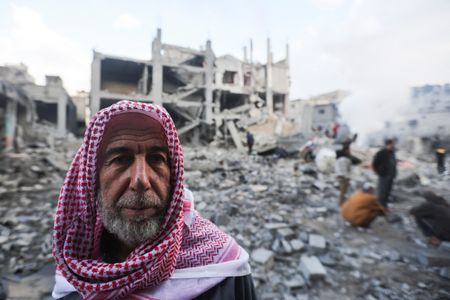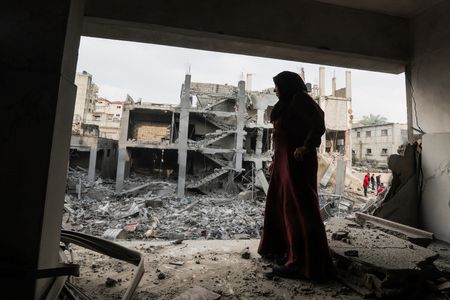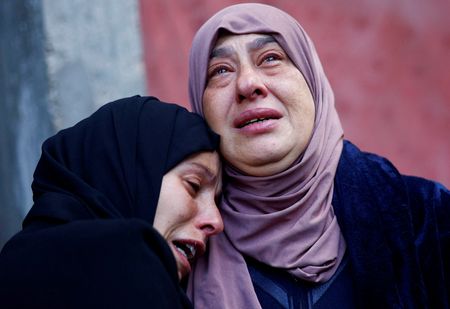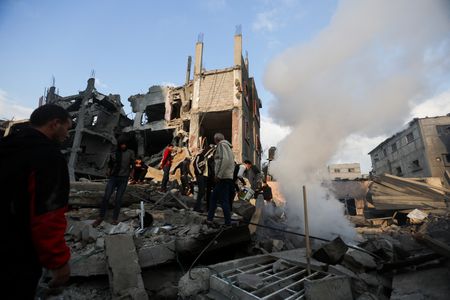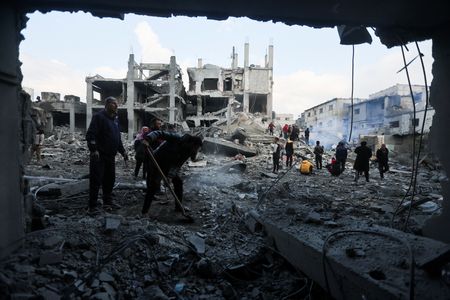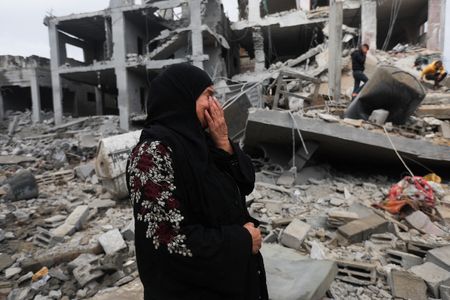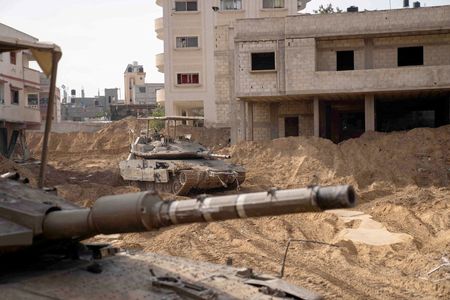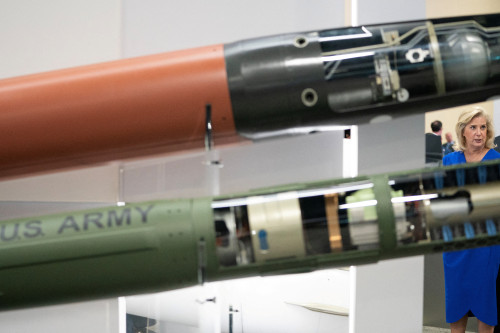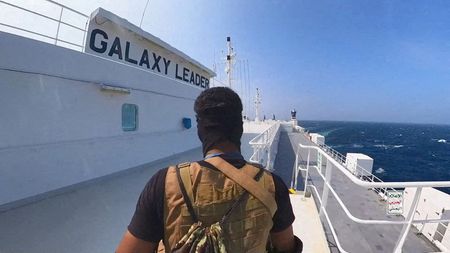By Nidal al-Mughrabi and Fadi Shana
CAIRO/GAZA (Reuters) -A U.S. security envoy discussed with Israeli officials on Thursday how to better protect civilians during their war against Hamas in Gaza and President Joe Biden appealed for lives in the Palestinian territory to be saved.
Israel pounded the 25-mile (40-kilometer) length of Gaza, killing families in their homes as the more than two-month-old conflict raged across the entire enclave, causing a humanitarian catastrophe with little end in sight.
“It will last more than several months – but we will win and we will destroy them,” Israeli Defence Minister Yoav Gallant told visiting White House national security adviser Jake Sullivan.
Sullivan said in an Israeli TV interview that he spoke to Prime Minister Benjamin Netanyahu about when Israel will shift from high-intensity military operations to a more precise, more targeted phase.
Sullivan did not provide a specific timeline or elaborate on what such operations would look like, although he said Israel was expected to continue its military campaign for some time.
“The issue really is, when does Israel shift from the high-intensity military operations that are under way today to a different phase of this conflict. One that’s more precise, more targeted,” Sullivan said on Israel’s Channel 12 television.
The occupied West Bank and the Gaza Strip need to be connected under a “revamped and revitalized” Palestinian Authority government, Sullivan said.
On Friday, Sullivan would discuss revamping the Palestinian Authority and holding “extremist” Jewish settlers accountable for violence against Palestinians when he visits Palestinian President Mahmoud Abbas in Ramallah, a U.S. official said.
U.S. President Joe Biden, asked whether he wanted Israel to scale back its assault on the Gaza Strip by the end of the year, said: “I want them to be focused on how to save civilian lives, not stop going after Hamas but be more careful.”
Washington has been pushing Israel for weeks to do more to protect civilians in Gaza’s population of 2.3 million.
Israel launched its campaign in retaliation for a rampage by Hamas, the Iran-backed group that rules Gaza, whose fighters killed 1,200 Israelis and seized 240 hostages in a cross-border raid on Oct. 7.
Since then, Israeli forces have besieged the coastal strip and laid much of it to waste, with nearly 19,000 people confirmed dead, according to Palestinian health officials, and thousands more feared buried under the rubble.
PEOPLE JAMMED IN MAKESHIFT TENTS
In the Rafah area, jammed with people in makeshift tents on Gaza’s southern edge, people wept at a morgue near bodies wrapped in bloodied shrouds.
Residents picked forlornly through the rubble of the adjacent homes of the Abu Dhbaa and Ashour families where Gaza health authorities said 26 people had been killed.
Neighbour Fadel Shabaan rushed to the area after the bombing. “It was difficult because of the dust and people’s screams,” he said. “This is a safe camp, there is nothing here, the children play soccer in the street.”
With Europe on alert for Islamist threats linked to the war, authorities in Denmark, Germany and the Netherlands said seven people, including four suspected Hamas members, were arrested on suspicion of planning attacks on Jewish institutions.
Hamas official Sami Abu Zuhri denied Hamas members were arrested, saying the reports were meant to erode support for Palestinians in Europe.
In further possible international fallout from the war, Danish company Maersk said a cargo ship was targeted by a missile off Yemen. A Maersk spokesperson said the vessel was not hit, denying a claim by Yemen’s Iran-aligned Houthi movement that the militia made a drone strike on a Maersk vessel sailing towards Israel.
Maritime security company Ambrey said a Malta-flagged, Bulgarian-owned bulk carrier was reportedly boarded in the Arabian Sea near the Yemeni island of Socotra.
Yemen’s Houthi group, which has warned cargo ships in the Red Sea to avoid travel toward Israel, has attacked vessels and fired drones and missiles at Israel since the Gaza war began.
Nearly all of Gaza’s residents have been forced from their homes, many several times.
The U.N. Palestinian Refugee Agency said hungry people were stopping trucks and eating food aid immediately. “We meet more and more people who haven’t eaten for one, two or three days,” its head Philippe Lazzarini told reporters in Geneva.
People in Gaza described begging for bread, paying 50 times more than usual for a single can of beans and slaughtering a donkey to feed a large family.
‘REVENGE’
Israel has extended its ground campaign from the north to the south this month.
In the main southern city Khan Younis, where advancing Israeli forces reached the centre this week, a whole city block was bombed overnight to dust. Though most people fled after Israeli warnings, neighbours digging with a hand shovel believed four people were inside. One body was recovered.
“May God take revenge on them,” said Nesmah al-Byouk, returning to the ruins of the home she had fled three days ago. “We came and saw everything destroyed … Where we can we go to now?”
In the north, fighting has escalated even after Israel announced its troops had largely completed their military objectives last month.
The Israeli military said its troops had dismantled a Hamas operating site in a school in the Shejaia area and destroyed two tunnel shafts, a rocket launch pit and a weapons storage facility in Khan Younis.
Elsewhere in the north in Jabalia, Gaza’s health ministry said Israeli forces had stormed a hospital, detaining and abusing medical staff and preventing them from treating wounded patients, at least two of whom had died.
Israel’s military said fighters had been operating inside the hospital, 70 of whom had surrendered.
(Reporting by Nidal al-Mughrabi in Cairo; Fadi Shana and Mohammed Salem in Gaza, Dan Williams, Ilan Rosenberg and Frank Jack Daniel in Jerusalem, Andrea Shalal in Washington and other Reuters bureaux;Writing by Peter Graff, Andrew Cawthorne and Grant McCool; Editing by Angus MacSwan, Mark Heinrich, William Maclean, Sharon Singleton and Cynthia Osterman)

